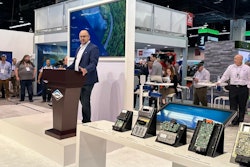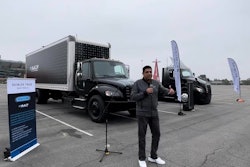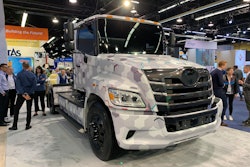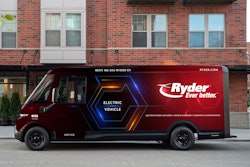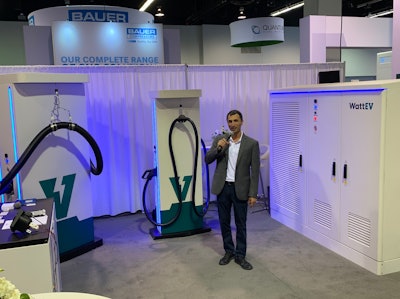
California-based WattEV, which offers electric trucks as a service, announced Wednesday at the Advanced Clean Transportation Expo in Anaheim, California, that their truck charging depot at the Port of Long Beach will open May 15 with capacity to charge dozens of Class 8 electric trucks.
WattEV CEO Salim Youssefzadeh said a 1.5-acre site located along Pier A Avenue will provide “13 dual port CCS [Combined Charging System], 360 kilowatt chargers with the ability to charge well over 60 trucks per day.”
Youssefzadeh added that the project was “quite an undertaking” since it took roughly 12 months to complete versus the industry average of 18 months.
Southern California Edison is providing 5 megwatts of power to the site which will be open to the public.
[Related: California now requiring electric trucks]
Youssefzadeh said the chargers are “a drop in the bucket” given the 20,000 trucks registered at the port, adding that more WattEV charging depots are on the way.
“It's not a one and done depot model. It's a network model where we're building out publicly available truck charging infrastructure starting with Long Beach,” Youssefzadeh said. “An electrifying corridor is going all the way up to Inland Empire to Northern California and along the I-10.
“So we're also happy to announce that we'll be opening up several other locations this year in San Bernardino, Bakersfield and Gardena, and that'll be over 20 megawatts of aggregate capacity with the ability to charge well over 150 trucks per day. It's a big amount,” Youssefzadeh continued.
WattEV’s inventory of Class 8 electric trucks continues to expand. Nikola announced today that WattEV signed up for 14 of its electric Tre cabovers, which will operate at the Port of Long Beach.
Michael Lohscheller, president and CEO of Nikola Corporation, applauded WattEV’s efforts plans for charging depots in a press release published earlier today.
“We anticipate the availability of WattEV’s charging depots will play a significant role in industry adoption and provide customers with immediate zero-emission solutions,” Lohscheller said.
Additional Class 8 electric trucks are on the way.
“We've got also another order of 50 Volvo VNR Electric trucks coming later this year and plans to order a lot more,” Youssefzadeh said.
With CCS chargers being tailored more so for smaller class vehicles, WattEV is setting its sights on Megawatt Charging Systems (MCS), which provide more than three times as much power.
“On CCS typically you'll see it go up to 360 kilowatts, which on a Volvo truck equates to about a two to three hour charge time,” Youssefzadeh said. “With MCS you're charging at 1.2 megawatts, which brings your charge time down to about 30 minutes. That reduces it significantly to where it becomes almost like a normal operation.”
MCS market share largely hinges on standard creation and adoption.
“We're developing that charging technology, but really we need to see the market going there on the vehicle side,” Youssefzadeh said. “In order for the vehicles to start adopting, we need to see wide scale adoption of the standard, which is nearly complete on CharIN, and then the demand side as well for the vehicle manufacturers to start producing.”
CharIN, or the Charging Interface Initiative, is an international non-profit that brings OEMs and utilities together for the purpose of establishing CCS and MCS global standards. The group has offices in Germany, Brussels, Hong Kong, South Korea, India, Japan, China and the U.S.


